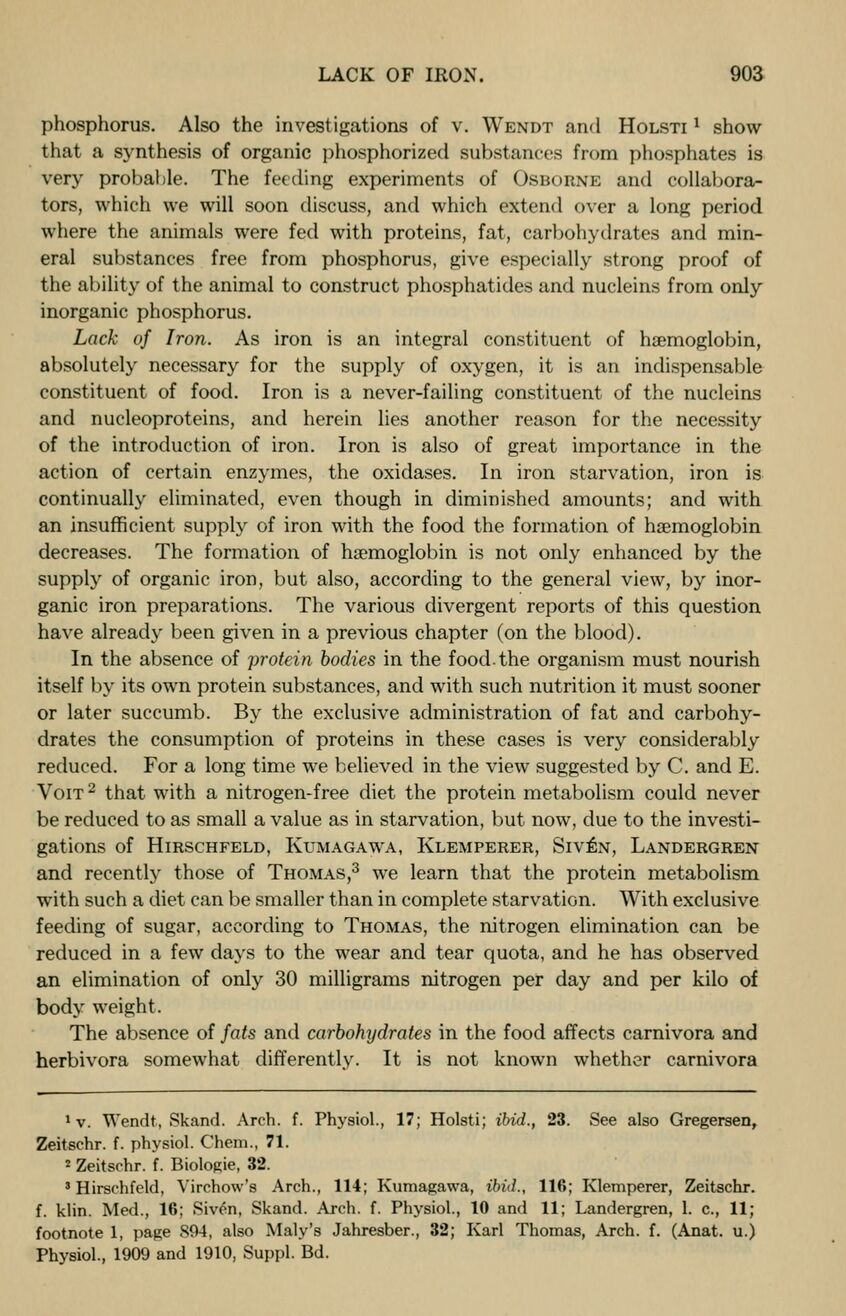
Full resolution (JPEG) - On this page / på denna sida - XVII. Metabolism - II. Metabolism in Starvation and with Insufficient Nutrition

<< prev. page << föreg. sida << >> nästa sida >> next page >>
Below is the raw OCR text
from the above scanned image.
Do you see an error? Proofread the page now!
Här nedan syns maskintolkade texten från faksimilbilden ovan.
Ser du något fel? Korrekturläs sidan nu!
This page has never been proofread. / Denna sida har aldrig korrekturlästs.
LACK OF IRON. 903
phosphorus. Also the investigations of v. Wendt and Holsti l
show
that a synthesis of organic phosphorized substances from phosphates is
very probable. The feeding experiments of Osborne and collabora-
tors, which we will soon discuss, and which extend over a long period
where the animals were fed with proteins, fat, carbohydrates and min-
eral substances free from phosphorus, give especially strong proof of
the ability of the animal to construct phosphatides and nucleins from only
inorganic phosphorus.
Lack of Iron. As iron is an integral constituent of haemoglobin,
absolutely necessary for the supply of oxygen, it is an indispensable
constituent of food. Iron is a never-failing constituent of the nucleins
and nucleoproteins, and herein lies another reason for the necessity
of the introduction of iron. Iron is also of great importance in the
action of certain enzymes, the oxidases. In iron starvation, iron is
continually eliminated, even though in diminished amounts; and with
an insufficient supply of iron with the food the formation of haemoglobin
decreases. The formation of haemoglobin is not only enhanced by the
supply of organic iron, but also, according to the general view, by inor-
ganic iron preparations. The various divergent reports of this question
have already been given in a previous chapter (on the blood).
In the absence of protein bodies in the food. the organism must nourish
itself by its own protein substances, and with such nutrition it must sooner
or later succumb. By the exclusive administration of fat and carbohy-
drates the consumption of proteins in these cases is very considerably
reduced. For a long time we believed in the view suggested by C. and E.
Voit 2
that with a nitrogen-free diet the protein metabolism could never
be reduced to as small a value as in starvation, but now, due to the investi-
gations Of HlRSCHFELD, IvUMAGAWA, KLEMPERER, SlVEN, LaNDERGREN
and recently those of Thomas,3
we learn that the protein metabolism
with such a diet can be smaller than in complete starvation. With exclusive
feeding of sugar, according to Thomas, the nitrogen elimination can be
reduced in a few days to the wear and tear quota, and he has observed
an elimination of only 30 milligrams nitrogen per day and per kilo of
body weight.
The absence of fats and carbohydrates in the food affects carnivora and
herbivora somewhat differently. It is not known whether carnivora
1
v. Wendt, Skand. Arch. f. Physiol., 17; Holsti; ibid., 23. See also Gregersen,
Zeitschr. f. physiol. Chem., 71.
2
Zeitschr. f. Biologie, 32.
’ Hirschfeld, Yirchow’s Arch., 114; Kumagawa, ibid., 116; Klemperer, Zeitschr.
f. klin. Med., 16; Siven, Skand. Arch. f. Physiol., 10 and 11; Landergren, 1. c, 11;
footnote 1, page 894, also Maly’s Jahresber., 32; Karl Thomas, Arch. f. (Anat. u.)
Physiol., 1909 and 1910, Suppl. Bd.
<< prev. page << föreg. sida << >> nästa sida >> next page >>